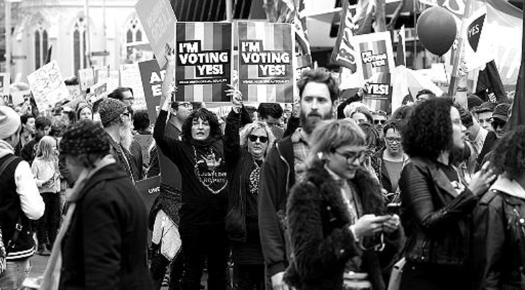
The Australian government conducted a voluntary postal survey between 12 September and 7 November 2017, ascertaining the views of Australians on legislating for same-sex marriage. The Yes campaign argued that it was a debate about equality. The No campaign put the focus on the definition of family, raising concerns about how issues like gender will be taught in schools. The campaign turned ugly at times, with graffiti on walls and shouting matches at public meetings.
The Australian Bureau of Statistics announced on Wednesday that 61.6% of voters in an unprecedented national postal survey approved a change to the law to allow couples of the same sex to marry. A bill to change the law was introduced into the Senate late on Wednesday. It will now be debated for amendments.
Those results will lead to consideration of a same-sex marriage bill in parliament with Prime Minister Malcolm Turnbull promising marriage equality should be law by Christmas, the Guardian reports. Australia’s chief statistician, David Kalisch, announced the results at a press conference in Canberra, revealing 7,817,247 people voted in favor and 4,873,987 voted against.
“They voted yes for fairness, yes for commitment, yes for love. And now it is up to us here in the parliament of Australia to get on with it, to get on with the job the Australian people asked us to do and get this done,” Turnbull said, stressing the law should change before Christmas.
“Together we have achieved something truly remarkable, a win for fairness and equality, not only for the LGBTI community and our families, but for all Australians,” Equality Campaign spokesman, Alex Greenwich, said.
The history of same-sex marriage in Australia includes its express prohibition by the Howard Government in 2004 when they changed the Marriage Act to define marriage as between a man and a woman. There were numerous subsequent attempts to legalize it at both federal and state/territory levels, none of which have succeeded as of 2017. Although a same-sex marriage law was passed by the Australian Capital Territory in 2013, it was struck down by the High Court on the basis of inconsistency with federal law. The Court's decision closed the possibility of concurrent state or territory laws that would allow same-sex marriage where federal law did not.
After the results were announced, a prominent No campaigner, Lyle Shelton, said: "We will now do what we can to guard against restrictions on freedom of speech and freedom of religion, to defend parents' rights, and to protect Australian kids from being exposed to radical LGBTIQ sex and gender education in the classrooms."
Photo Credits: Wikimedia
